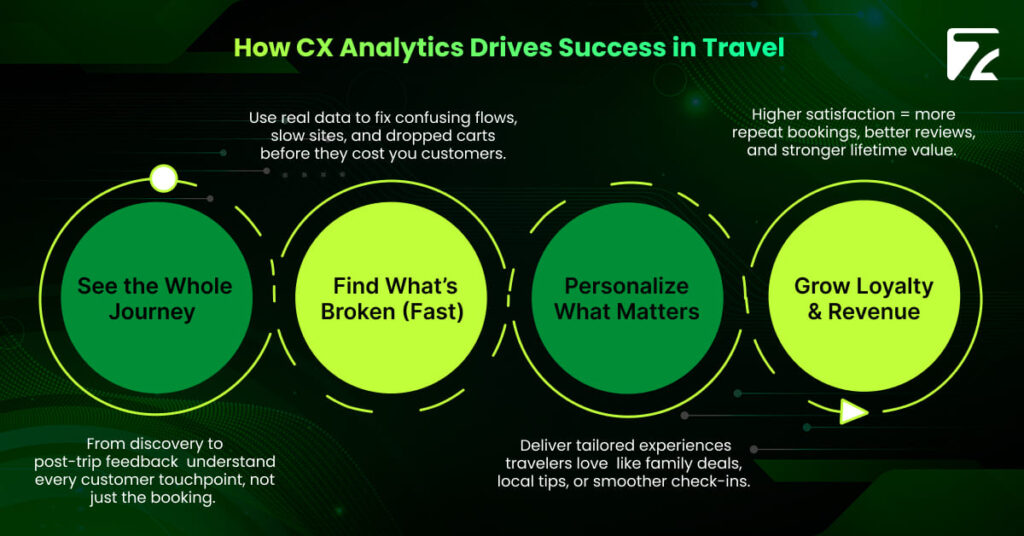If you could sit down with every one of your customers and ask, “Hey, what made you book that trip?” or “Why did you leave halfway through checkout?” would you?
Of course you would.
That kind of insight would be a goldmine.
And while you can’t interview everyone one-on-one, Customer Experience Analytics (CX analytics) is the next best thing. It’s not just about collecting numbers it’s about understanding behavior, emotions, and intent across the entire travel journey.
And when you know what your travelers want, what frustrates them, and what keeps them coming back?
That’s when things start to click bookings, loyalty, revenue all of it.
Think of it as the “behind-the-scenes” view of every customer interaction.
Every time someone visits your site, scrolls through packages, clicks a destination, drops off before booking, or reaches out to support that’s all data.
CX analytics pulls it all together and helps you figure out:
It’s less about traffic numbers and more about why people behave the way they do.

Travel is one of the most emotionally charged industries out there.
You’re not selling a product you’re selling memories, experiences, sometimes even dreams.
So when something goes wrong a glitchy app, a confusing checkout flow, a missed confirmation that emotion flips fast.
In short: every second and every click matters.
To use CX analytics well, you’ve got to understand the full customer journey not just where they book, but everything before and after.
Here’s what that usually looks like:
Googling “best islands in Greece” at 1 AM. Scrolling Instagram for travel inspo. Clicking your ad.
Comparing prices. Reading reviews. Maybe starting to build an itinerary.
Decision time. This is where you either convert… or lose them.
Flight updates, hotel check-ins, customer support this is where things can get stressful fast.
Reviews, feedback, loyalty rewards. Or… silence.
If you’re only tracking bookings, you’re missing 80% of the picture.
You don’t need a wall of dashboards. Just focus on these:
“How likely are you to recommend us?”
Simple. Honest. Tells you who’s a fan and who’s not.
“How was your experience today?”
A quick post-support rating. Great for spotting cracks in service.
“How easy was it to book/change/cancel?”
The harder it is, the faster people leave.
How many customers disappear over time? And more importantly why?
How much revenue does one happy customer bring in over time?
(Hint: It’s almost always more than you think.)
Let’s say your OTA notices that Priya always books kid-friendly beach resorts.
Next time she logs in? She sees curated family packages, discounts on child fares, and flexible checkout times.
She books. Again.
That’s CX analytics in action.
Not just personalization for the sake of it but thoughtful, useful recommendations that make someone’s life easier.
And that kind of experience? It builds trust. Loyalty. And revenue.
This doesn’t have to be a massive tech project. Start simple:
Are people dropping off before payment? Not opening your emails? Leaving bad reviews?
Pick one problem. Solve that first.
Use tools like:
Don’t let data live in silos. Bring it into one dashboard or CRM so you can actually see the whole journey.
Where are people hesitating? What’s causing confusion? What’s leading to upsells?
Change button copy. Simplify your cart. Reduce clicks. And track what happens next.
| The Problem | What to Do About It |
|---|---|
| Data scattered everywhere | Use one CRM to centralize it |
| Feedback no one reads | Use sentiment analysis & tag common issues |
| Privacy concerns | Stay compliant (GDPR, CCPA, etc.) |
| Not enough team bandwidth | Outsource to a BPO or use automated platforms |
Look at:
1. Higher NPS and CSAT scores
2. More repeat bookings
3. Lower cost per support ticket
4. Fewer bad reviews
5. More “wow” moments in customer feedback
You’ll know it’s working when people stop seeing you as a booking tool and start seeing you as their go-to travel partner.
CX analytics isn’t about more dashboards.
It’s about knowing your travelers better than anyone else and building something they actually want to come back to.
So don’t guess. Don’t hope. Don’t assume.
Use the data.
Make small improvements.
And turn every touchpoint into a chance to earn trust.
It’s how you track what customers are doing, feeling, and saying so you can make their journey better.
Because travel is emotional. One bad moment can ruin the whole trip. Analytics helps you spot and fix those moments fast.v
Start with one tool. Or partner with someone like Zeal Connect who can help you scale without the overhead.
NPS tells you if customers would recommend you. CSAT is about how they felt after a specific interaction.

Travel Automation Expert